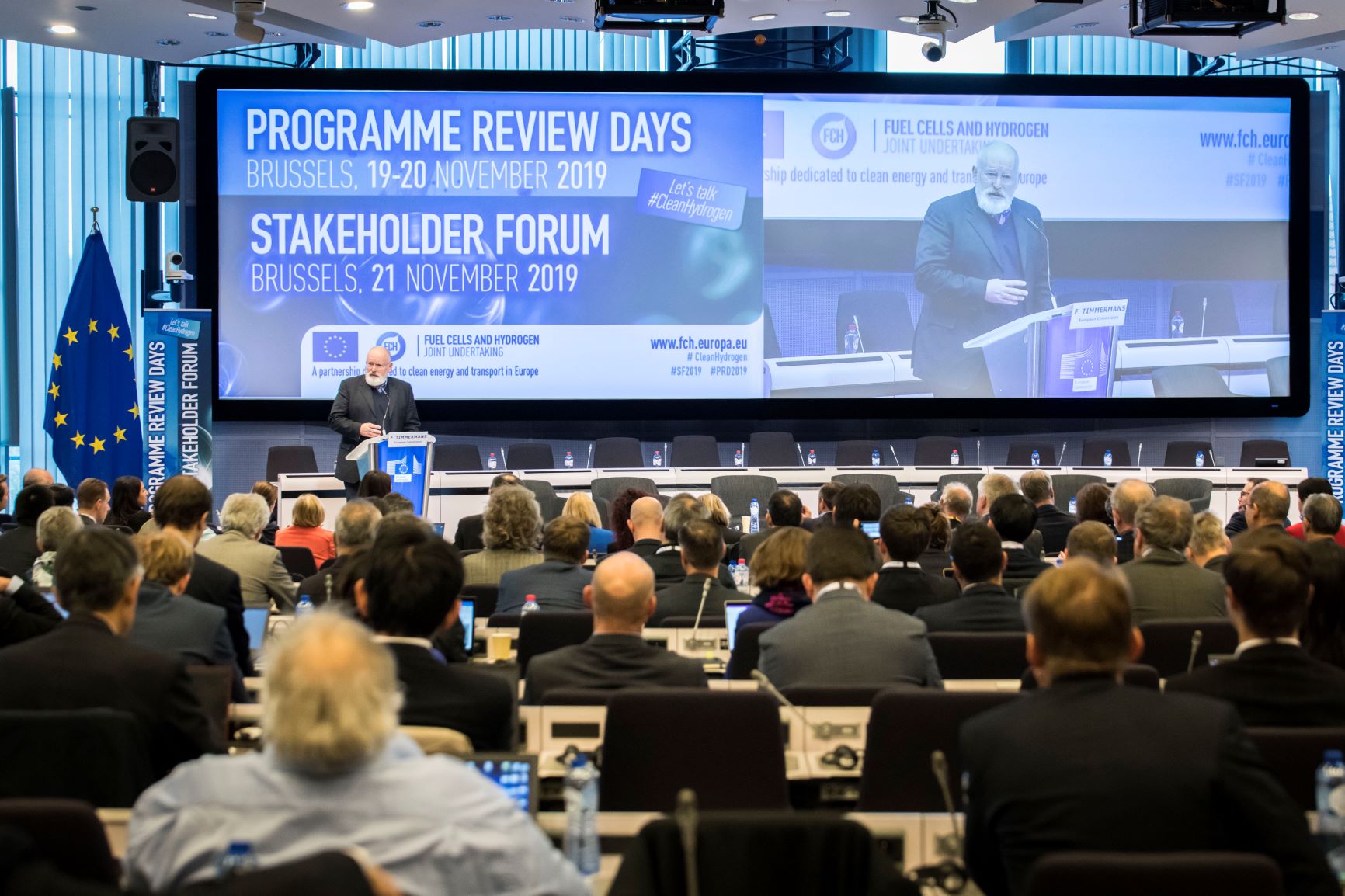
“The green energy transition is not an option but a necessity. I see a pivotal role for clean hydrogen…it is an area where Europe is still leading. Why not extend the lead on something that could be one of the most important solutions for clean energy?’ said Frans Timmermans, First Vice-President of the European Commission, in the opening session of the 2019 Fuel Cells and Hydrogen Joint Undertaking (FCH JU) Stakeholder Forum, on 21 November in Brussels.
‘The most important thing is that you help us to find ways to make relatively quick successes to show people that it works’ continued Timmermans,” addressing the forum – energy and climate experts from industry, research, EU institutions, and local and regional authorities.
Hydrogen is an essential component in Europe’s energy transition and its efforts to cut carbon emissions and tackle climate change. It is therefore expected to play an important role in the European Commission’s Green Deal. The FCH sector is also a valuable source of future jobs and growth in a green economy.
Discussions among more than 500 Forum participants in Brussels’ Charlemagne building focused on how to tackle the remaining hurdles to deployment, the importance of promoting an innovation culture in activating new markets, and the impact of synergies and international scale-up efforts on growth and jobs. Delegates explored the latest developments in the sector, showing how Europe is capitalising on new FCH developments and forging ahead towards a zero-emission economy.
Speakers in the four sessions reflected on the latest FCH JU achievements (see also 2019 FCH JU Award Winners) and the ways to strengthen the relationship between private and public stakeholders in this fast-growing sector. They underlined the need for scaling-up, for shaping-up regulation, as well as for strengthened public support and funding synergies.
- Bart Biebuyck, FCH JU Executive Director, welcomed the participants and highlighted the programme results: “By the end of the year, the FCH-JU will have supported 263 projects for a combined public-private investment of 2 billion Euros. In these projects, for every Euro of public money, the private sector has equally supplied 1 Euro. In Horizon 2020 alone, we are reaching a total leverage effect of 2.5 despite the fact that only 0.6 was required by the regulation. In other words, the private partners have committed 4 times more investment than originally required. This demonstrates the huge willingness of the sector to invest.”
- Valérie Bouillon-Delporte, Chair of the FCH JU Governing Board and president of industry association Hydrogen Europe said: “Hydrogen is here to grow, and massively. It will enable the deepest decarbonisation scheme the world has ever seen. To this purpose, Horizon Europe presents a real opportunity to speed up the innovation cycle toward fully decarbonised energies.”
- Herald Ruijters, DG MOVE remarked: “We planted the seed through joint public-private investments in key projects that enable what I feel as being a very different hydrogen momentum”.
- “We can deliver fast, at competitive prices and safely” confirmed Nils Anders Røkke of the Norwegian independent research organisations SINTEF.
- “We are happy we are based in Europe. It is the place on the globe to be to develop these technologies” added Nils Aldag of Sunfire, a leading global cleantech company.
- Marc d’Hooge, European Investment Bank: “Synergies are important. There are many actors involved and lots to do as hydrogen needs a bigger scale and there are too many small initiatives”.
European Commission Director-General for Energy, Ditte Juul Jørgensen addressed the participants in the closing of the forum: “Renewable Hydrogen is the basis for sectoral integration, for energy transition, and shall become a cost-effective pathway to succeed the clean energy transition. Studies indicated that if we tap into the full potential offered by green Hydrogen we would be able to reduce our CO2 emissions with 96% by 2050”.
Mauro Petriccione, Director General for Climate Action in the European Commission, completed the picture: “Hydrogen will be even more at the centre of the energy transformation and the question is how much faster do we want the hydrogen technologies to be deployed and marketed if we want to achieve our decarbonisation plans?” (..) “We see a potential for production to be scaled-up rapidly, we see the potential for the market to pick up rapidly, but we need to make sure that two are matching – fast enough for the purpose of the transformation we envisage and that European citizens are asking for. We need a market mechanism that brings supply and demand together which will receive initially public support until is able to self-regulate itself (…) Thank you for what you are doing for developing this wonderful technology, concluded Petriccione”.
During the Stakeholder Forum, participants and those passing by the Charlemagne building of the European Commission had the opportunity to see some of the most innovative racing vehicles powered by hydrogen. They were presented by the ACO – H24Racing team and Forze Hydrogen Electric Racing of University of Delft – the first hydrogen electric racing team in the world. Moreover, the FCH JU, together with the ACO and Hydrogen Europe signed a letter of intent to promote hydrogen technology, demonstrate its potential and actively contribute to the energy transition. “Cars are our thing, but our objective is mobility, freedom of movement for all, but with an eye on the future, making sure we leave a planet for new generations to enjoy” said Pierre Fillon, president of the Automobile Club de l’Ouest.
Source: FCHJU
Read the most up to date Fuel Cell and Hydrogen Industry news at FuelCellsWorks




